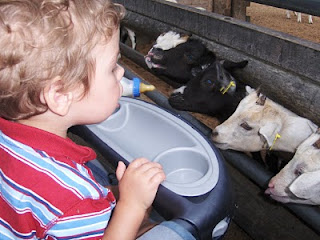On the other hand, I wanted to be there--to learn as much as I could about WS, to meet other families, to know that we're not alone in this journey. And in those respects, the conference was a blessing.
And Buddy enjoyed it. (We'll need to work on his rhythm.)
It was almost magical to watch when the band began to play and all those with WS began gravitating toward the source of the music en masse.
And it was encouraging to watch this guy do his thing on the drums and wonder if that would be Buddy in a decade or so.
1. Therapy works. Although I know that the various early interventions (occupational therapy, speech therapy, physical therapy, etc.) work for typically developing children, there's been a nagging thought at the back of my head that maybe therapy wouldn't make a huge difference in the case of those with genetic disorders. However, Dr. Morris (a woman who has spent the last 20 years of her professional life researching Williams syndrome) mentioned in one of her sessions that the 9-10 year-olds she sees today are much further along than the 9-10 year-olds she saw just 10 years ago. Early diagnosis and intervention really do work. And I was encouraged to continue doing all we can to help Buddy gain every advantage.
2. Phonics works. In another session, Dr. Mervis (another WS researcher who happens to teach at a university just an hour away from us) presented her findings that those WS children who had been taught to read with a phonics program (instead of a sight-word or whole-language approach) were reading at or above what they should have been reading for their IQ level. Hooked on Phonics here we come. (if you're interested in reading Dr. Mervis's paper on the topic, send me an email and I'll send it to you.)
3. Music works. Several sessions emphasized the importance of incorporating a musical aspect to learning with WS kids--for example, through a music-minded unit study approach or teaching through song.
4. Replays works. Dr. Levine is another WS specialist and has developed a behavior modification technique she calls "Replays" which helps treat anxieties and emotional/behavioral problems in children with special needs (although she said her technique also works with typically developing children, too).
We also had a bit of fun while there when we attended nearby Grant's Farm with other WS families on Thursday evening.
We got to feed baby goats, see Clydesdale horses, ride on a carousel, and wander among a lot of other kinds of animals. It was a great evening.
We've returned to the real world and settled into the regular "normal" once again. But we're already looking forward to the next gathering in Boston in two years.


No comments:
Post a Comment